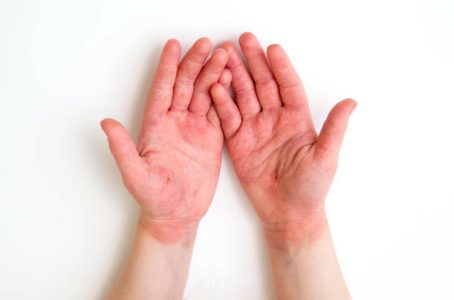Eczema is a skin condition wherein the skin becomes red, itchy, inflamed and dry. Eczema can be of several types, including atopic dermatitis, contact dermatitis, dyshidrotic eczema and seborrheic dermatitis. The exact cause of eczema is still unknown, but there are several treatment options available today to help diminish its effects and reduce pain/discomfort. Some treatments can include:
- Topical medication
- Phototherapy
- Immunosuppressant medication
- Biologics
Are allergies common in atopic eczema?
Atopic eczema is usually not caused or worsened by food allergies. The majority of people with mild atopic eczema do not have food allergies and do not need to avoid certain foods. However, in infants and young children with moderate to severe eczema, or if the skin condition worsens after eating a specific food, testing for food allergies may be performed.
Older children and adults may be sensitized to environmental allergens, such as house dust mites (HDM), cockroaches, or animal dander.
What are the types of allergy tests?
There are 3 main types of allergy tests commonly done in atopic eczema
1) Skin prick test
The skin prick test is a fast and safe test that can be carried out in all age groups, including babies. Some common allergens that can be tested include food allergens like milk, soy, wheat, egg white, peanut and shrimp, as well as environmental allergens such as house dust mites.
The skin prick test is a fast and safe test that can be carried out in all age groups, including babies. Some common allergens that can be tested include food allergens like milk, soy, wheat, egg white, peanut and shrimp, as well as environmental allergens such as house dust mites.
During a skin prick test, the skin is first marked (with ink) to help identify the allergen. The allergen solution is then placed beside the mark. The skin is then pricked through the drop. This prick is superficial and does not cause bleeding. The doctor will check the area after 20 minutes. If the skin prick test is positive, a wheal with swelling and redness will develop at the site of the prick. No reaction to the skin prick test indicates that you are not allergic to the test substance. Skin prick tests tend to have a high negative predictive value.
2) Allergen-specific IgE antibody test
Allergen-specific IgE antibody test is another type of allergy test that is commonly performed. This is suitable for people who had severe allergic reactions such as anaphylaxis or breathing difficulties. IgE antibodies to specific allergens can be found in the blood in patients who have true allergies. If specific IgE antibodies are not present, you are not allergic to that allergen. If high levels of specific IgE antibodies are present in people with symptoms, you may be allergic to the allergen.
Allergen-specific IgE antibody test is another type of allergy test that is commonly performed. This is suitable for people who had severe allergic reactions such as anaphylaxis or breathing difficulties. IgE antibodies to specific allergens can be found in the blood in patients who have true allergies. If specific IgE antibodies are not present, you are not allergic to that allergen. If high levels of specific IgE antibodies are present in people with symptoms, you may be allergic to the allergen.
3) Skin patch test
Although atopic eczema is a form of endogenous eczema, external allergens may sometimes play a role in aggravating the condition. In some people, a contact allergy may develop on contact with substances that are usually harmless to others. The most common allergens are nickel, (in costume jewellery), cosmetics, dyes, perfumes, metals, industrial chemicals, rubber products, preservatives and medicaments. A patch test can be done to confirm the presence or absence of contact allergy.
Although atopic eczema is a form of endogenous eczema, external allergens may sometimes play a role in aggravating the condition. In some people, a contact allergy may develop on contact with substances that are usually harmless to others. The most common allergens are nickel, (in costume jewellery), cosmetics, dyes, perfumes, metals, industrial chemicals, rubber products, preservatives and medicaments. A patch test can be done to confirm the presence or absence of contact allergy.





